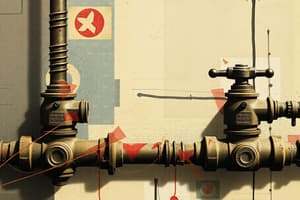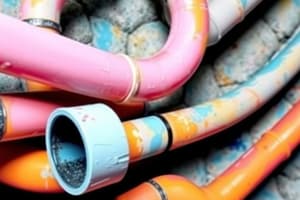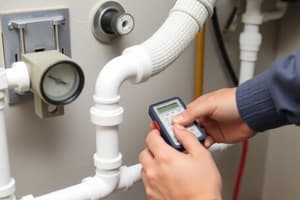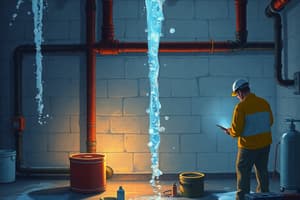Podcast
Questions and Answers
What process describes water molecules moving apart to form vapor?
What process describes water molecules moving apart to form vapor?
- Precipitation
- Infiltration
- Condensation
- Evaporation (correct)
Which of the following materials is commonly used for modern water pipes as opposed to cast iron?
Which of the following materials is commonly used for modern water pipes as opposed to cast iron?
- HDPE (High Density Polyethylene)
- MDPE (Medium Density Polyethylene) (correct)
- Copper
- PVC (Polyvinyl Chloride)
What is the primary purpose of WRAS-approved fittings?
What is the primary purpose of WRAS-approved fittings?
- To connect different types of pipes
- To ensure legal compliance with water regulations (correct)
- To enhance the aesthetic quality of plumbing
- To reduce water pressure
What is the correct order of the water cycle phases mentioned?
What is the correct order of the water cycle phases mentioned?
Which of these is NOT a type of surface water identified?
Which of these is NOT a type of surface water identified?
What is the role of a screw down ferrule in a water distribution system?
What is the role of a screw down ferrule in a water distribution system?
What kind of environmental issue is addressed by the Water Regulations?
What kind of environmental issue is addressed by the Water Regulations?
What is the diameter of the main pipe typically reduced to in a domestic distribution system?
What is the diameter of the main pipe typically reduced to in a domestic distribution system?
What distinguishes boreholes from traditional wells?
What distinguishes boreholes from traditional wells?
What type of water is permanent hard water primarily composed of?
What type of water is permanent hard water primarily composed of?
What is the main characteristic of soft water?
What is the main characteristic of soft water?
What effect does heating temporary hard water to 65°C have?
What effect does heating temporary hard water to 65°C have?
What is plumbosolvency?
What is plumbosolvency?
What is indicated by a pH value below 7 in water?
What is indicated by a pH value below 7 in water?
Which type of water is typically not provided by a water undertaker?
Which type of water is typically not provided by a water undertaker?
Which of the following is a potential issue caused by acidic soft water?
Which of the following is a potential issue caused by acidic soft water?
What is the primary purpose of the Water Regulation Advisory Scheme (WRAS)?
What is the primary purpose of the Water Regulation Advisory Scheme (WRAS)?
What type of pipe is commonly used in modern domestic cold water distribution systems?
What type of pipe is commonly used in modern domestic cold water distribution systems?
Which of the following is involved in the process of precipitation in the water cycle?
Which of the following is involved in the process of precipitation in the water cycle?
Which environmental concern do the Water Regulations specifically address?
Which environmental concern do the Water Regulations specifically address?
In a mains distribution system, what is the smallest diameter pipe typically found serving individual houses?
In a mains distribution system, what is the smallest diameter pipe typically found serving individual houses?
What does a screw down ferrule connector allow in a water distribution system?
What does a screw down ferrule connector allow in a water distribution system?
What is the sequence of water distribution from the trunk main to smaller pipes?
What is the sequence of water distribution from the trunk main to smaller pipes?
Which of the following types of surface water is NOT mentioned as part of the cold water distribution system?
Which of the following types of surface water is NOT mentioned as part of the cold water distribution system?
What defines temporary hard water?
What defines temporary hard water?
What type of water is considered free from calcium carbonates and sulfates?
What type of water is considered free from calcium carbonates and sulfates?
Which type of underground water source can be described as a modern equivalent to wells?
Which type of underground water source can be described as a modern equivalent to wells?
What happens to calcium carbonate in water when it is heated to 65°C?
What happens to calcium carbonate in water when it is heated to 65°C?
Which of the following correctly describes plumbosolvency?
Which of the following correctly describes plumbosolvency?
What is a characteristic of permanent hard water?
What is a characteristic of permanent hard water?
What does a pH value above 7 indicate about water?
What does a pH value above 7 indicate about water?
What can be a consequence for individuals drawing water directly from a well with low pH?
What can be a consequence for individuals drawing water directly from a well with low pH?
Flashcards
Private Water Supply
Private Water Supply
Water supplied by a private source, often underground, and not subject to water regulations.
Borehole
Borehole
A deep, drilled hole in the ground that extracts water from underground aquifers.
Spring
Spring
A naturally occurring source of water that flows to the surface.
Plumbo Solvency
Plumbo Solvency
Signup and view all the flashcards
Temporary Hard Water
Temporary Hard Water
Signup and view all the flashcards
Permanent Hard Water
Permanent Hard Water
Signup and view all the flashcards
Soft Water
Soft Water
Signup and view all the flashcards
pH Scale
pH Scale
Signup and view all the flashcards
Evaporation
Evaporation
Signup and view all the flashcards
Precipitation
Precipitation
Signup and view all the flashcards
Condensation
Condensation
Signup and view all the flashcards
Reservoir
Reservoir
Signup and view all the flashcards
River
River
Signup and view all the flashcards
Trunk Main
Trunk Main
Signup and view all the flashcards
MDPE Pipe (Medium Density Polyethylene)
MDPE Pipe (Medium Density Polyethylene)
Signup and view all the flashcards
Screwdown Ferrule Connector
Screwdown Ferrule Connector
Signup and view all the flashcards
MDPE Pipe
MDPE Pipe
Signup and view all the flashcards
Cold Water Distribution
Cold Water Distribution
Signup and view all the flashcards
Water Regulations (WRAS)
Water Regulations (WRAS)
Signup and view all the flashcards
Study Notes
Cold Water Systems
- The presentation is about domestic cold water systems, including the rainwater cycle, water distribution, and regulations.
- Learners will be able to understand the rainwater cycle and where different sources of water come from.
- Learners will be able to explain how water is routed to a domestic house.
- Learners will be able to identify each pipe and connection on a typical incoming main to a property.
- Learners will be introduced to soft and hard water and the factors that make them different.
- The presentation also covers the water regulations (1999) and the Water Regulations Advisory Scheme (WRAS).
- WRAS approved fittings comply with UK regulations and are a quality product, corrosion-resistant within their environment.
- The Water Regulations replaced individual bye-laws to give a national law for England and Wales.
- These regulations apply to waste, undue consumption, misuse, contamination, and erroneous measurement of water.
- The rainwater cycle involves evaporation from oceans, lakes, and streams, condensation, transpiration from plants, precipitation, and groundwater/surface runoff.
- The presentation details the different types of surface water, including lakes, rivers, streams, and reservoirs.
- A typical mains distribution system involves a trunk main, water treatment plant, and water mains that distribute water to houses and buildings.
- The pipes in the systems are typically now made from medium-density polyethylene (MDPE) pipe, instead of cast iron.
- Communication pipes are owned and maintained by water undertakers.
- Service pipes are owned and maintained by house owners.
- Underground water sources (wells, boreholes, and springs) are not typically covered by the Water Regulations.
- Boreholes are smaller, less intrusive, and easier to maintain than wells.
- Springs are naturally occurring sources of water that force water to the surface.
- Water hardness is classified as soft, semi-hard, or hard, based on mineral content.
- The ability of water to absorb minerals is called plumbo solvency.
- Permanent hard water contains calcium sulphates, and its hardness cannot be removed by boiling.
- Temporary hard water contains calcium carbonates, and its hardness can be removed by heating to 65°C.
- Soft water is free from calcium carbonates and sulphates, and it is easy to lather with soap.
- The pH scale indicates whether water is acidic or alkaline. A pH below 7 indicates acidic water which can be corrosive.
- Plumbers must be aware of water type and quality, as these factors can affect appliances.
- Plumbers have a responsibility to maintain the quality of water supplied by the water undertaker, avoiding contamination.
- A 600mm main is divided into smaller pipes, ultimately resulting in a 25mm pipe serving a particular area.
- 20mm MDPE pipes may be used to serve individual houses.
- Pipes are often connected using fittings.
- Screwdown ferrule connectors or service unions connect water to individual buildings.
Studying That Suits You
Use AI to generate personalized quizzes and flashcards to suit your learning preferences.




